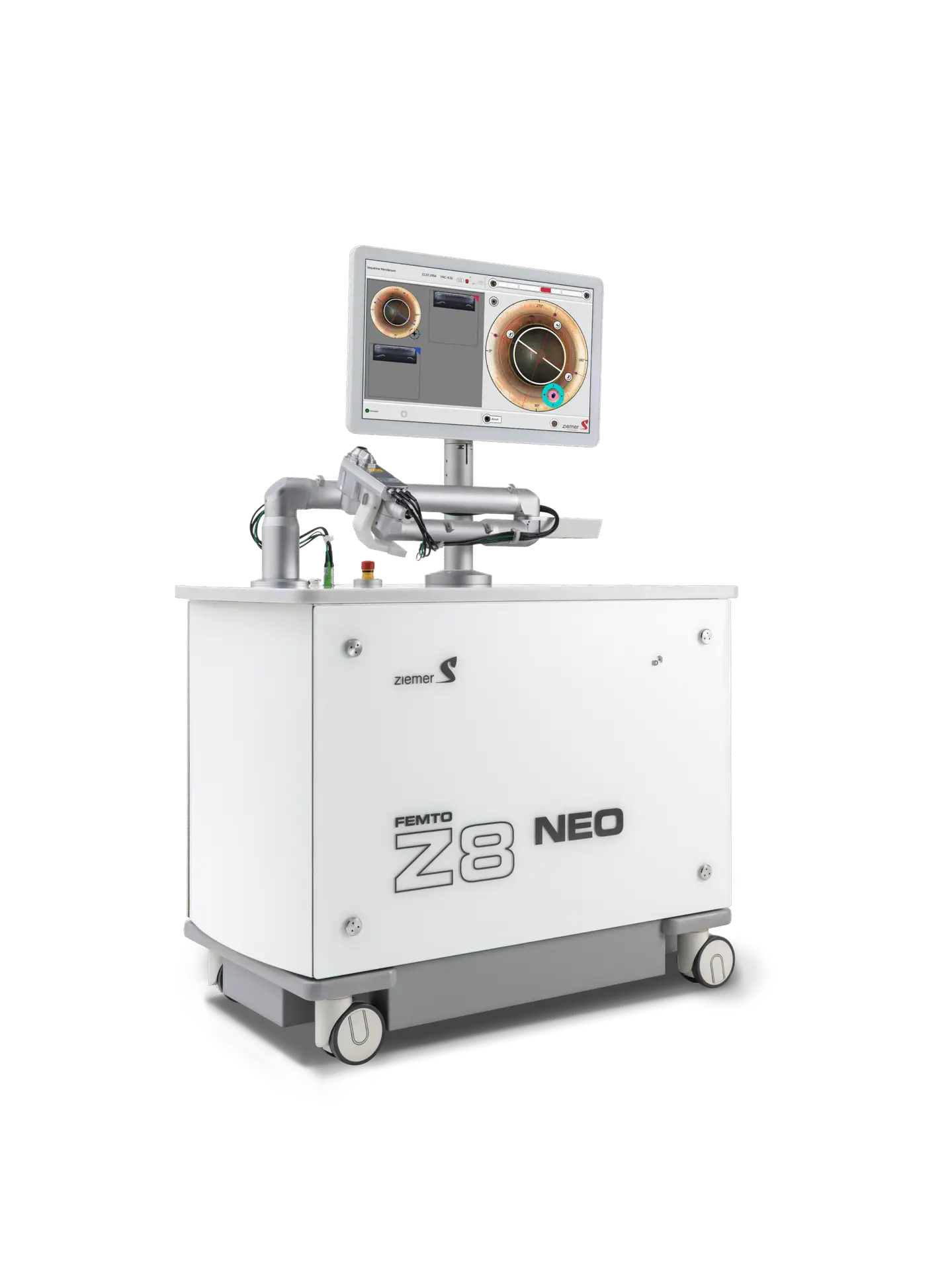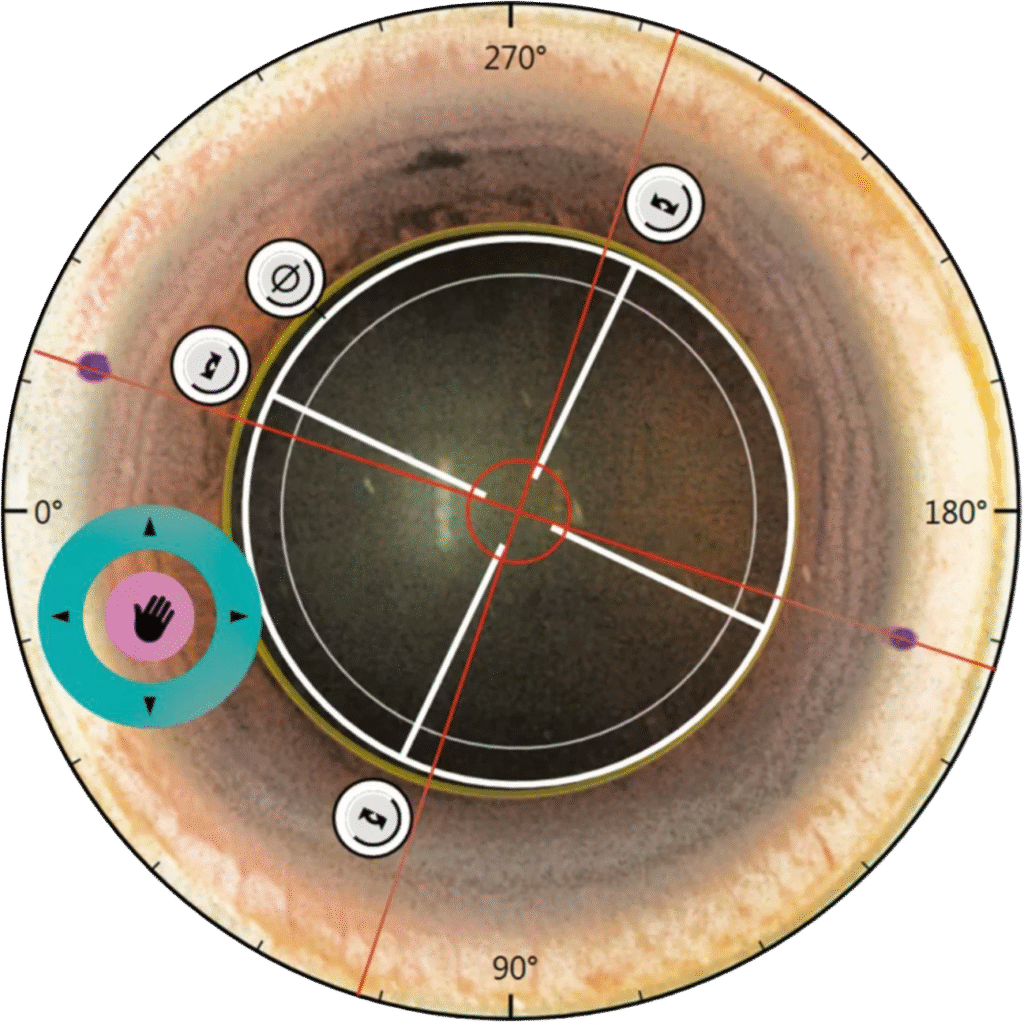Robotic Laser Cataract Surgery:Z-CATARACT
Now introducing robotic laser cataract surgery with the Ziemer FEMTO Z8 NEO

What are cataracts?
Cataracts are a common eye condition characterised by the clouding of the natural lens within the eye. This leads to impaired vision as light cannot effectively enter the eye. Cataracts usually develop gradually with age however, they can be caused by other factors as well, such as an eye injury or underlying health problems.
What are the symptoms of cataracts?
- Cloudy, blurred or dimmed vision
- Sensitivity to light
- Difficulty seeing at night particularly noticeable when driving
- Frequent changes in glasses or contact lens prescription
- Colours appearing less vibrant, dull and sometimes yellowed
- Noticing halos (rings) around lights, particularly at night
Key Benefits of Cataract Surgery
- Improved vision
- Regained independence
- Reduced risk of trips and falls
- Customized lenses
- Long lasting results
- Greatly reduced dependence on glasses

How is robotic laser Z-CATARACT performed?
1 – The robotic laser creates small openings (incisions) using low energy, providing very precise and customized openings.
2 – The laser creates a perfectly circular opening in the lens capsule to access the cataract.
3 – The laser then fragments the clouded lens into small segments for easier removal.
4 – The pieces of the lens are aspirated and removed from the eye. The pre-fragmented segments require less energy to remove.
5- A new foldable intraocular lens (IOL) is placed inside the eye. No stitches or sutures are usually required.
Understanding Z-CATARACT Surgery

What are the advantages of robotic laser Z-CATARACT?
Precision and safety: Allows the surgeon to design the incision down to the micron level, substantially enhancing accuracy.
Needle and blade-free: Reduces the need for several surgical instruments and eliminates the use of blades.
Faster surgery and recovery time: Reduces the amount of ultrasonic energy necessary to remove the cataractous lens and enhances recovery time.
IOL stability: The replacement lens (IOL) is more stable after laser surgery.
Optimized visual results: Premium intraocular lenses are now incredibly effective when inserted during surgery. The optical benefits of these newer lenses can be fully realized with femtosecond laser cataract surgery.

Why is ZIEMER FEMTO Z8 NEO the best choice for robotic laser cataract surgery?
Nanojoule technology: Very low pulse energy used minimises stress to surrounding tissues.
Surgical Imaging: Intra-operative OCT imaging and machine learning algorithms for automated edge detections and cut placements.
Precision: Creates capsulotomies with exceptionally smooth edges, efficient lens fragmentation and arcuate incisions for the correction of astigmatism.
Customization: Surgeons can adjust incision parameters like width and position to best suit the individual eye.
What types of lens implants (IOLs) are available?
At Angel Eyes we offer all types of IOL implants to best suit your visual requirements and your lifestyle. All IOLs mentioned below are available in toric (astigmatism correcting) and non-toric versions.
| Expected Quality of Vision Without Glasses | ||||
|---|---|---|---|---|
| IOL Type | Distance (Driving, cinema) | Intermediate (Computer) | Near (Reading) | Notes |
| Monofocal | Excellent | Excellent vision for distance but glasses required for intermediate and near work. | ||
| Advanced Monofocal | Excellent | Possibly | Advanced monofocals offer better vision than standard monofocal lenses, but less than EDOF. They may improve intermediate vision for some patients. | |
| Bifocal | Good | Good | Glare and halos may occur. | |
| Enhanced Depth of Focus (EDOF) | Excellent | Good | Possibly | These lenses provide less near vision than Trifocals. Most users see well for reading but will need glasses for small print. Glare and halos may occur. |
| Trifocal | Good | Good | Good | Glare and halos may occur. |
Available Packages
Laser Cataract Surgery
Non-Laser Cataract Surgery
Z-CATARACT PackageLaser Cataract Surgery
Starting From
-
Foldable Lenses
-
2.2mm Laser Incision, Capsulotomy and Fragmentation
-
Alcon Centurion Active Fluidics Technology
-
Surgery and Lens Cost Included
-
Three Follow-up Visits Included
PREMIUM Z-CATARACT PackageLaser Cataract Surgery
Starting From
-
Premium Toric, EDOF and Multifocal Lenses Available
-
2.2mm Laser Incision, Capsulotomy and Fragmentation
-
Alcon Verion Customised Treatment
-
Alcon Centurion Active Fluidics Technology
-
Surgery and Lens Cost Included
-
Three Follow-up Visits Included
Standard Package
Small Incision Surgery
Starting From
-
Surgery and Lens Cost Included
-
Three Follow-up Visits Included
Phaco PackageMicro Incision Surgery
Starting From
-
Foldable Lenses
-
2.2mm Keratome Incision
-
Alcon Centurion Active Fluidics Technology
-
Surgery and Lens Cost Included
-
Three Follow-up Visits Included
Premium PackageMicro Incision Surgery
Starting From
-
Premium Toric, EDOF and Multifocal Lenses Available
-
Alcon Verion Customised Treatment
-
2.2mm Keratome Incision
-
Alcon Centurion Active Fluidics Technology
-
Surgery and Lens Cost Included
-
Three Follow-up Visits Included
Inclusions and Exclusions of Surgical Packages for Cataract Surgery
Please Note: Every patient is different and each eye’s cataract surgery will have its own particular requirements to give the best possible visual outcome. We have created surgical packages to provide clarity on costs and minimise confusion. However, at times in unforeseen circumstances, some extra cost may be incurred and we will explain these to you fully. We hope you will trust our judgement in that situation.
For your understanding, please read through the list of inclusions and exclusions of each cataract surgical package:
INCLUSIONS OF CATARACT SURGICAL PACKAGES:
- Complete surgical counselling.
- Cataract diagnostic workup which includes IOL Master 700.
- Retina checkup wherever required.
- Pre-anaesthesia check-up whenever required.
- Operation theatre charges including all patient monitoring and safety equipment.
- Surgeon’s operating fees.
- Required surgical equipment as per chosen package. For microincision cataract surgery (Phaco) packages: Alcon Centurion or Alcon Legion phacoemulsification machine along with Leica operating microscope. For laser cataract surgery (LCS) packages: Ziemer Femto Z8 Neo. For toric and other premium IOLs: Alcon Verion.
- Cost of intraocular lens (IOL).
- Cost of disposables and medications used during surgery.
- All TPA paperwork and file work along with counselling.
- Up to 3 post-operative consultations within the 1-month period following surgery.
EXCLUSIONS OF THE CATARACT SURGICAL PACKAGES (APPLICABLE IN ALL CASES):
- Pre-operative blood investigations.
- Post-operative medicines and eye drops etc.
EXCLUSIONS WHICH MAY BE REQUIRED IN SOME CASES:
- Fitness from a physician when required.
- OCT investigation of the eye.
- Specular microscopy investigation of the eye.
- Viscoat/Hyloject-CS.
- Services of Anaesthesiologist (as standby/IV sedation/Full GA).
- Anaesthesia medicines.
- Any emergency medicine.
- Intraoperative blood sugar monitoring and nebulization.
Frequently Asked Questions
Is cataract surgery painful?
Generally, cataract surgery is not painful, as the eye is numbed with anaesthetic drops and injection around the eye. Some irritation is possible after surgery which settles with the prescribed eye drops.
Can cataracts return after surgery?
No, they cannot return as the natural lens has been removed and replaced with an artificial lens.
How long does recovery take?
For most patients, significant visual improvement is experienced within the first few days’ post-surgery. Typically, cataract eye surgery healing time can take around 4-6 weeks. During this recovery period, you should follow your surgeons’ advice, including using prescribed eye drops and avoiding vigorous activities.
Will glasses be required after surgery?
Glasses may still be required depending on the type of lens chosen.